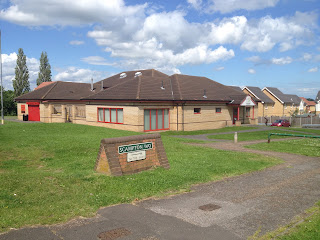To be more accurate, for most of the day I'm going to or returning from Gainsborough. It's a three-hour train trip there and three hours back. The whole meeting lasts two hours and I have a quarter of an hour for my presentation.
There are 40 attendees, representing Voluntary and Community Sector (and a few public sector) organisations in the area. There are four formal presentations, each lasting roughly fifteen minutes:
- Grant White from Lincolnshire County Council, on their Lincolnshire Funding Portal
- Me from the Regional Equality and Diversity Partnership, on our Equality Standard
- Christina Daly from CG Partnership, on their apprenticeship scheme
- Steve Ward from Lincolnshire County Council Trading Standards Illegal Money Lending Team, on their week of action in September
At the start of my presentation, I ask how many attendees have attended an REDP event: none. I ask how many people have heard of REDP before this presentation: none. While I'm here to promote our Equality Standard, I have to take the first five minutes or so to introduce REDP, say who we are and describe what we do. I also show off some of the free literature which I've brought with me.
After the four presentations, we go round the room, giving everyone else the opportunity to introduce themselves and their organisations, updating everyone on activities, needs and news. There's an impressive range of projects and a heartening variety of responses to the pressures they are enduring in these austere times. Before the end of the meeting there's a chance to chat, to mingle and to pick up literature from the various groups attending. Several people express their interest in getting their organisations involved with REDP. We exchange contact details and make promises to follow up. More than one person tells me that they could have done with knowing about us three years ago and they ask where we’ve been hiding! While my purpose here today is to encourage these VCS organisations to take up our Equality Standard, which is one of our ways of ensuring REDP's continuity and sustainability, those who have had no information or involvement before are more interested in more general aspects of our work.
REDP’s three-year period of funding by the Big Lottery ends tomorrow: 30 June. This is the last working day that we’re funded. Today's experience goes to show that even if we'd had another three years we still wouldn't have reached every part of the East Midlands or drawn in every VCS organisation in the region.
This may well be my last paid gig for REDP. After all this time building and promoting partnership, it’s ironic that I’m here doing this on my own today. We core partners are sure that REDP will continue. It’s entering a period of transition and it’s not yet clear what will emerge to carry on the work or who will be doing it. I hope I don’t fall off the back of the truck as it progresses along this bumpy road.







